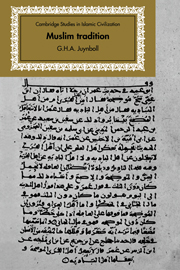Book contents
- Frontmatter
- Contents
- Preface
- Note to the Reader
- Introduction
- 1 A tentative chronology of the origins of Muslim tradition
- 2 The role of qāḍīs in the spreading of traditions
- 3 The man kadhaba tradition and the prohibition of lamenting the dead. An investigation into mutawātir traditions
- 4 An appraisal of muslim ḥadīth criticism. Rijāl works as depositories of transmitters' names
- 5 ‘Accepting traditions means knowing the men’
- Appendix I
- Appendix II
- Appendix III
- Appendix IV
- Appendix V
- Bibliography
- Index (glossary)
2 - The role of qāḍīs in the spreading of traditions
Published online by Cambridge University Press: 04 August 2010
- Frontmatter
- Contents
- Preface
- Note to the Reader
- Introduction
- 1 A tentative chronology of the origins of Muslim tradition
- 2 The role of qāḍīs in the spreading of traditions
- 3 The man kadhaba tradition and the prohibition of lamenting the dead. An investigation into mutawātir traditions
- 4 An appraisal of muslim ḥadīth criticism. Rijāl works as depositories of transmitters' names
- 5 ‘Accepting traditions means knowing the men’
- Appendix I
- Appendix II
- Appendix III
- Appendix IV
- Appendix V
- Bibliography
- Index (glossary)
Summary
Al-quḍātu thalātha: qāḍiyāni fi ′n-nār wa-qāḍin fi ′l-janna: rajulun qaḍā bi-ghayri ′l-ḥaqqi fa-ʿalima dhāka fa-dhāka fi ′n-nār wa-qāḍin lā yaʿlamu fa-ahlaka ḥuqūqa ′n-nās fa-huwa fi ′n-nār wa-qāḍin qaḍā bi ′l-ḥaqq fa-dhālika fi ′l-janna.
A prophetic saying transmitted on the authority of Burayda b. al-Ḥuṣayb, from the Jāmi′ of Tirmidhī, kitāb al-aḥkām 1.Introduction
In the previous chapter I have indicated on various occasions among the early Islamic transmitters of traditions certain distinct categories, such as the early quṣṣāṣ, the ‘ulamā’, the fuqahāʾ and also those who sometimes combined more than only qiṣaṣ, or only ʿilm, or only fiqh in their transmission.
In the present chapter it is proposed to scrutinize in more detail the ḥadīth output – if any – of another category of people, who seem to constitute excellent study material for drawing conclusions as to how the spreading of ḥadīth in early Islam fared at the hands of a certain group of officials, namely the qāḍīs. But what distinguishes the qāḍīs favourably as a group from the above-mentioned categories is the fact that, whereas the above-mentioned admit – besides the synchronic one – only partially of a diachronic historical approach, since common distinctive characteristics soon became blurred in the course of the first two centuries a.h., the aāḍīsʾ spreading of ḥadīth can be studied diachronically just as well as synchronically because the function was never abolished. This study also admits of drawing overall conclusions as to qāḍīsʾ procedures when the various centres of the early Islamic empire are compared with one another.
- Type
- Chapter
- Information
- Muslim TraditionStudies in Chronology, Provenance and Authorship of Early Hadith, pp. 77 - 95Publisher: Cambridge University PressPrint publication year: 1983

